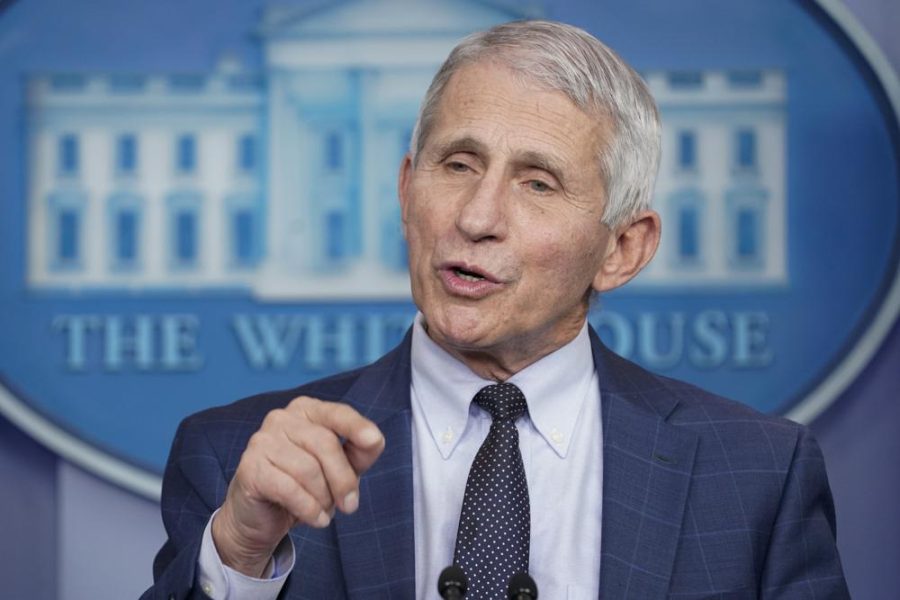Omicron emerges as potential new public health threat
Dr. Anthony Fauci at a Dec. 1 press conference at the White House discussing the omicron variant.
It doesn’t seem long since the delta variant of COVID-19 hit many people worldwide. Now, we have another variant named “omicron” – which may be far more threatening than the delta variant.
Omicron, initially identified in Botswana in southern Africa on Nov.11, is a mutation in which 43 mutant sites, more than twice as many as the previous variants, were found in the external protrusion protein (also known as the spike proteins) of the novel Coronavirus.
As a result, the World Health Organization (WHO) as well as CDC have classified omicron as a mutation of concern – equivalent to the delta variant – on Nov. 26. Variant of concern is designated when there is enough evidence of increased transmission or severity and decreased vaccine or therapeutic efficacy.
According to a British journal and WHO, as a result of analyzing data from the South African National Health Checkup Agency, it took 100 days for the delta variant to become the dominant variant accounting for the majority of all confirmed cases, but it only took about 20 days for omicron.
The severity of the omicron variant is being questioned since cases are still being diagnosed two weeks to two months after immunization, when the vaccine is expected to provide the most protection against COVID-19.
Then, where did this variant come from?
A scientist at the University College London (UCL) Genetics Research Center in London said it is possible the omicron variant developed during a chronic infection in an untreated HIV/AIDS patient with compromised immune function. In this case, he explained, the virus in the body is not removed due to continuous replication, further increasing the probability of overlapping mutations, compared to in patients with normal immune function.
Including the first case of the variant on Dec. 1 in a traveler who returned from South Africa, a total of 36 cases have been reported in the U.S. These cases have already widely spread across 12 states, including eight cases in New York, seven in California, six in Nebraska, two in Colorado and one in New Jersey in a Georgia resident, Hawaii, Maryland, Massachusetts, Minnesota, Missouri and Pennsylvania.
Now — the biggest question is if currently available vaccines will protect us from this variant.
David Ho, professor of microbiology and immunology at Columbia University, anticipates a higher vaccine resistance rate in the omicron variant due to its mutations in the spike proteins.
“The vaccine antibodies target three regions on the coronavirus spike, and omicron has mutations in all three of those regions,” Ho said. “We technical experts are much more worried than the public health experts because of what we know from the structural analysis of omicron.”
However, Dr. Anthony Fauci, director of the National Institute of Allergy and Infectious Diseases and the Chief Medical Advisor to the president, recommended eligible individuals to receive the booster shot.
“When you get a high enough immune response, you get spill over protection even against the variant the vaccine wasn’t specifically directed at,” Fauci said during a press conference. “Even though we don’t have a lot of data running, there’s every reason to believe that that kind of increase that you get with a boost would be helpful at least at preventing severe disease of a variant like omicron.”
Although there is great hope for the efficacy of the existing vaccines, there is still not enough information available about omicron. The WHO, Dr. Fauci and President Joe Biden announced it will take more than two weeks to further obtain a clear understanding of the variant, including its contagiousness, severity and other characteristics. Therefore, it is too early to make hasty judgments.
With Christmas holiday and family gatherings quickly approaching, taking precaution is crucial to prevent further spread of the variant. Anyone considering traveling during the holiday season must consider their personal risk as well as practical concerns regarding their destination, and mask up when surrounded by a large crowd – even outdoors.














Isabella • Dec 14, 2021 at 11:01 AM
Thank you for keeping Oakland students up to date with important news! If others had actually read the article before commenting they would have known that this was actually a very well-researched article. It is made up of facts and evidence explaining why the omicron variant could become a public health threat, not that it is one. Please continue with these important updates and keep up the amazing work!
Tammi B. • Dec 7, 2021 at 8:05 AM
While Covid remains a concern generally, it is irresponsible to report that the omicron variant is a public health threat when symptoms are very mild and not even one single death has been attributed to it.
Mike • Dec 7, 2021 at 12:51 PM
It is nothing but MSM fear porn trying to scare you into compliance. resist and ignore these tyrants. The continuance of the pandemic at this point is a political decision and not one of protecting the public.